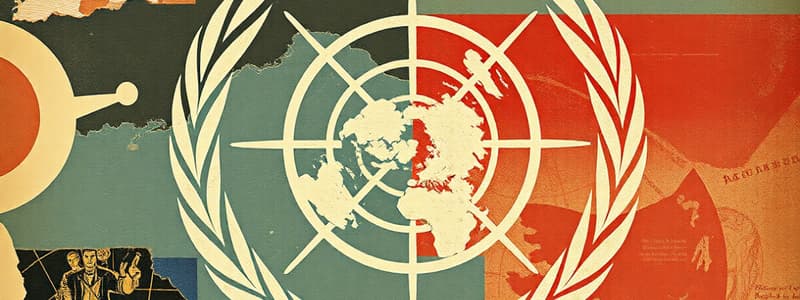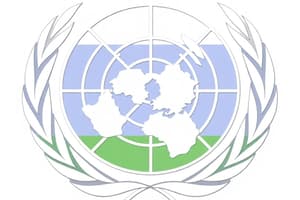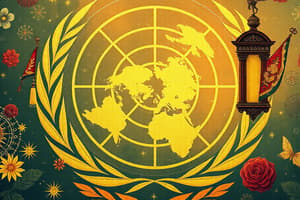Podcast
Questions and Answers
Which United Nations body is primarily responsible for maintaining international peace and security?
Which United Nations body is primarily responsible for maintaining international peace and security?
- Security Council (correct)
- International Court of Justice
- Economic and Social Council
- General Assembly
What significant principle was established by the Peace of Westphalia in 1648?
What significant principle was established by the Peace of Westphalia in 1648?
- The principle of sovereignty (correct)
- The abolition of monarchies across Europe
- The establishment of the United Nations
- International trade agreements
What distinguishes external sovereignty from internal sovereignty?
What distinguishes external sovereignty from internal sovereignty?
- The ability to enforce laws within a state
- Recognition by other states as a peer (correct)
- Influence over neighboring countries
- Control over domestic tax policies
During which months does the main part of the United Nations General Assembly meet each year?
During which months does the main part of the United Nations General Assembly meet each year?
What impact did the Thirty Years' War have on the development of international relations?
What impact did the Thirty Years' War have on the development of international relations?
Which of the following options is NOT a recognized body of the United Nations?
Which of the following options is NOT a recognized body of the United Nations?
How many members does the United Nations currently have, considering the inclusion of the Holy See and the State of Palestine?
How many members does the United Nations currently have, considering the inclusion of the Holy See and the State of Palestine?
Which of the following is a component of internal sovereignty?
Which of the following is a component of internal sovereignty?
What is the main function of the Economic and Social Council within the United Nations?
What is the main function of the Economic and Social Council within the United Nations?
What significant historical event occurred in Europe between 1618 and 1648, marking a pivotal point in international relations?
What significant historical event occurred in Europe between 1618 and 1648, marking a pivotal point in international relations?
Which of the following levels of analysis focuses on the behavior of individual actors in international relations?
Which of the following levels of analysis focuses on the behavior of individual actors in international relations?
What is the primary perspective of Realism regarding the nature of politics in international relations?
What is the primary perspective of Realism regarding the nature of politics in international relations?
Which theory of international relations suggests a pessimistic view regarding the possibility of change?
Which theory of international relations suggests a pessimistic view regarding the possibility of change?
What characterizes Multinational Corporations (MNCs) in the context of levels of analysis?
What characterizes Multinational Corporations (MNCs) in the context of levels of analysis?
Which of the following actors is associated with the Domestic Level of analysis?
Which of the following actors is associated with the Domestic Level of analysis?
Which theory encompasses both conflictual and cooperative possibilities among states and other actors?
Which theory encompasses both conflictual and cooperative possibilities among states and other actors?
What is the primary focus of Constructivism in international relations?
What is the primary focus of Constructivism in international relations?
Which of the following statements about Historical Materialism is true?
Which of the following statements about Historical Materialism is true?
What is the most significant variable in the Liberalism theory regarding international relations?
What is the most significant variable in the Liberalism theory regarding international relations?
In the context of international relations, which actor is classified as a non-state actor?
In the context of international relations, which actor is classified as a non-state actor?
What was the primary aim of the Congress of Vienna?
What was the primary aim of the Congress of Vienna?
What does the Balance of Power Process primarily involve?
What does the Balance of Power Process primarily involve?
Which of the following accurately describes the effect of the Congress of Vienna on Europe?
Which of the following accurately describes the effect of the Congress of Vienna on Europe?
What is the primary purpose of a theory in the context of International Relations?
What is the primary purpose of a theory in the context of International Relations?
Why do multiple theories exist within the field of International Relations?
Why do multiple theories exist within the field of International Relations?
Which of the following is NOT a stated use of theory in the context provided?
Which of the following is NOT a stated use of theory in the context provided?
During the Congress of Vienna, which entity did not benefit from the redistribution of power?
During the Congress of Vienna, which entity did not benefit from the redistribution of power?
What fundamental question does the study of International Relations seek to address?
What fundamental question does the study of International Relations seek to address?
Which of the following best describes a characteristic of theories as noted in the content?
Which of the following best describes a characteristic of theories as noted in the content?
In what way did the Napoleonic Wars influence the Congress of Vienna?
In what way did the Napoleonic Wars influence the Congress of Vienna?
Flashcards are hidden until you start studying
Study Notes
Key Players in International Relations
- The United Nations is an international organization founded in 1945 with 193 member states.
- The UN includes:
- Security Council
- General Assembly
- Economic and Social Council
- Secretariat (Secretary-General)
- International Court of Justice
- Trusteeship Council
The Peace of Westphalia
- The Peace of Westphalia (1648) marked the end of the Thirty Years' War.
- It set the groundwork for the modern nation-state system and introduced the concepts of:
- State sovereignty
- The political rights of monarchs
International Relations Concepts
- Internal Sovereignty refers to a state's exclusive control over its internal affairs.
- External Sovereignty is a state's recognition by other states as an equal partner.
- Balance of Power is a principle of international relations that aims to prevent any individual nation from dominating others.
- To achieve balance of power, nations may increase their internal power
- Form alliances with other nations
- The Congress of Vienna (1814-1815) was a series of meetings that aimed to reorganize Europe after the Napoleonic Wars, restore prior power structures, and maintain a balance of power.
- Although the balance of power persisted until the First World War, it failed to prevent the outbreak of major conflicts.
Global Conflicts
- World War I (1914-1918) involved Germany, Austria-Hungary, and the Ottoman Empire against Great Britain, the U.S., France, Russia, Italy, and Japan.
- World War II (1939-1945) resulted in the deaths of an estimated 70 to 85 million people. These significant conflicts spurred the development of International Relations as a field of study.
Theories in International Relations
- Theories in International Relations attempt to simplify reality for better understanding.
- Their key functions include:
- Description
- Explanation
- Prediction
- Control
- Realism theory focuses on states as key actors, emphasizing the competitive nature of international politics.
- Liberalism emphasizes economic cooperation and the importance of non-state actors.
- Constructivism focuses on the role of ideas, norms, and identities in shaping world affairs.
- Historical Materialism centers on economic classes as the core drivers of international relations.
- Feminism examines gender as a factor in international relations.
Different Levels of Analysis in International Relations
- International Relations theories utilize different levels of analysis:
- Global Level: Focuses on world-scale events and trends.
- Interstate Level: Examines relations between states.
- Domestic Level: Investigates how internal dynamics shape a state’s foreign policy.
- Individual Level: Examines the role of individuals in shaping international relations.
- Each theory emphasizes different actors, variables, and levels of analysis to explain international phenomena.
Studying That Suits You
Use AI to generate personalized quizzes and flashcards to suit your learning preferences.




